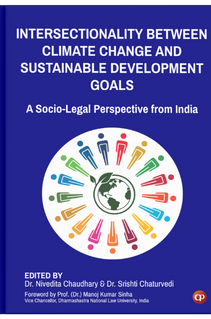Power Lines, Power Players and The Indian Supreme Court: The M K Ranjitsinh Case and The Challenge of Integrating Species Conservation into Infrastructure Development

by Udit Raj Sharma1 & Arpita Shukla2
1Assistant Professor of Law, School of Law, University of Petroleum and Energy Studies, Dehradun, India; 2Third Year Undergraduate Student, School of Law, University of Petroleum and Energy Studies, Dehradun, India.
10.46679/9788196780524ch05
This chapter is a part of: Intersectionality Between Climate Change and Sustainable Development Goals: A Socio-Legal Perspective from India
ISBN (Ebook):978-81-967805-2-4
ISBN (Hardcover Print):978-81-967805-0-0
ISBN (Softcover Print):978-81-967805-3-1
© CSMFL Publications & its authors.
Published: August 28, 2025
https://dx.doi.org/10.46679/9788196780524ch05
Abstract
The Supreme Court, in recent years, has faced several matters concerning environmental law, animal law and infrastructure issues. One such important matter, inter alia, was MK Ranjitsinh Case, where the court stood at the crossroad of energy sector development and habitat conservation of the Great Indian Bastard (GIB). The matter concerned laying down of overhead transmission lines for the power transmission which were proving disastrous for the GIB. In its 2021 judgment, which we refer as GIB -1, the court ruled in favour of the habitat conservation of the GIB and ordered not to lay overhead transmission lines from the sensitive area. In its 2024 judgment, which we refer as GIB-2, the Court modified its ruling to a certain extent on learning from the Central Government that its directions in GIB-1 were too impractical to implement. Alongside the GIB- 2, the Apex Court made a remarkable observation and held that the people have a fundamental right to be free from adverse impacts of climate change. The Court opined that it’s necessary to carve out the right to be protected against the adverse effects of climate change as a distinct right. The research attempts to do the critical analysis of GIB-1 & GIB-2, especially the latter, in order to examine the impacts of recognition of this ‘newly enunciated right’ and whether it extends to non-human animals as well since they are amongst the worst affected from climate change.
Keywords: Great Indian Bustard, Climate Rights, Wildlife Law, Eco-centric, Sustainable.
References
- Alabi, S.A. (2012) Climate Change and the Ageing Population: Enforcing the Rights to Life and Health under Human Rights, Health and Climate Change Regimes. Pittsburgh Journal of Environmental and Public Health Law 7, 79.
- Birnie, R., Boyle, A., & Redgwell, C. (2009). International law and the environment (3rd ed., pp. 271–275). Oxford University Press.
- M.K. Ranjitsinh v. Union of India, (2024) SCC OnLine SC 570, W.P. (C) No. 838 of 2019 (Supreme Court of India, decided on March 21, 2024).
- M.K. Ranjitsinh v. Union of India, AIR ONLINE 2021 SC 209.
- United Nations. (2015). Paris Agreement. United Nations Framework Convention on Climate Change. https://unfccc.int/sites/default/files/english_paris_agreement.pdf
This book is available worldwide via EBSCOhost Academic Collection, EBSCO E- books, Google Play Books, Amazon, World Cat Discovery Service/OCLC, CSMFL Bookstore, and 200+ book resellers and academic content vendors.
Statement on Publication Ethics
We, at CSMFL Publications, are committed to ensure the unbiased and transparent publishing, and upholding the high standards of editorial integrity in our publications. To know more, please read our Statement on Publication Ethics, Editorial Integrity & Misconduct